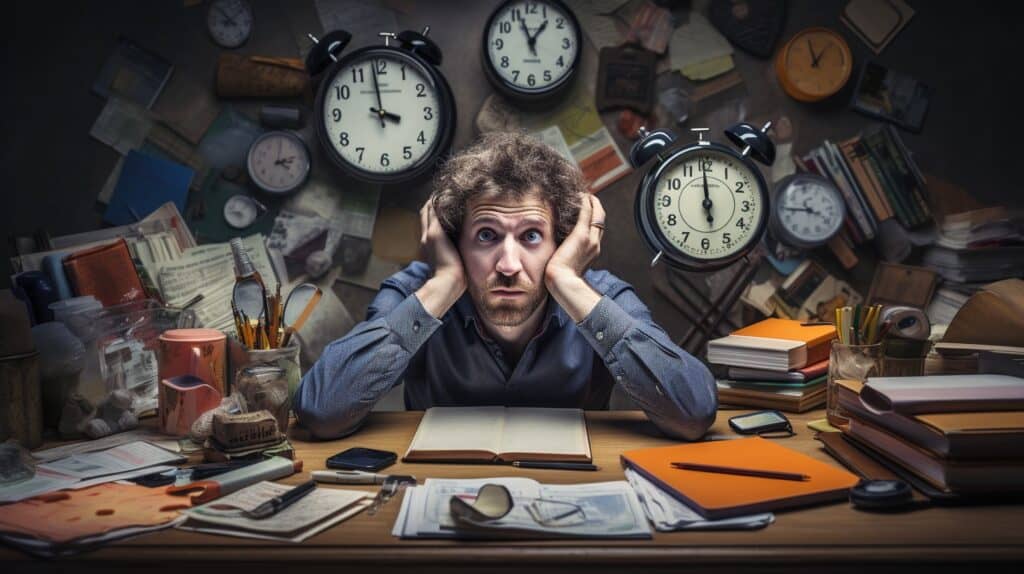Navigating the waters of adult ADHD is a daily odyssey, battling a sea of distractions and the relentless ticking of the clock. Living this reality, I understand the chaos—all too well—of chasing deadlines that slip through your fingers like sand and trying to harness thoughts that scatter in every direction.
My guide is more than just advice; it’s a collection of tried-and-true tactics designed specifically for men who are ready to master their symptoms and steer their lives with confidence.
Join me as we embark on this journey together toward calmer shores.
Key Takeaways
Men with adult ADHD might not seem hyper but can have trouble with details, staying still, and waiting their turn.
ADHD can make work and talking to people harder because it’s easy to lose focus or forget things.
To live better with ADHD, men should keep spaces tidy, set routines, break big jobs into small parts, and use tools like reminders.
Handling money well is important. Write down when bills are due and plan how to spend cash each month.
Table of Contents
Understanding the ADHD Experience for Men

When it comes to the ADHD experience for men, it’s often a story untold, with symptoms sometimes flying under the radar compared to women. Men may find themselves grappling with inattention and restlessness, yet these signs can be dismissed as merely being “scatterbrained” or overly energetic.
If you’re one of the 11 million adults in the United States with adult attention deficit hyperactivity disorder, you understand how hard it can be to avoid distractions, stay organized and work efficiently. With treatment and behavioral changes, you can learn how to handle ADHD to increase productivity and fulfillment. These simple, effective strategies can help you manage symptoms to focus and thrive.
https://advancedpsychiatryassociates.com/resources/blog/strategies-for-adults-living-with-adhd/
Societal expectations of masculinity further complicate the picture, masking their struggles and delaying diagnosis or support. What’s more, adult ADHD can manifest differently in men; while hyperactivity is commonly associated with childhood ADHD, adult men are more likely to deal with impulsivity and emotional regulation issues that go beyond just an inability to sit still.
Identifying ADHD Symptoms in Adult Men
I get how tough it can be to spot ADHD symptoms. It’s not just about being hyper or bouncing off the walls. Men like us might miss details, feel restless inside, or find it hard to wait our turn in conversations.
Sometimes, we start projects but never finish them, and keeping our desks organized feels like an uphill battle. These signs often slip under the radar because we’re supposed to “have it all together.”.
If these symptoms are significantly impacting your daily life, discussing options with your doctor can help. Stimulants for ADHD like Adderall or Ritalin, may be an option to help manage symptoms, but lifestyle changes and coping strategies can also be very effective.
Let’s face reality: adults with ADHD struggle with time management and staying on track. We may put things off until the last minute or lose our keys more times than we care to admit.
It’s a real challenge that goes beyond normal forgetfulness or occasional restlessness – it affects every part of life, from work to home. It takes more than willpower; recognizing these symptoms is the first step towards getting help and managing better.
How Adult ADHD Manifests Differently in Men Compared to Women
Now that we’ve looked at identifying ADHD symptoms in men let’s talk about how it shows up differently for us compared to women. Men with ADHD often feel the pressure to be in control and hide their struggles, which can look like not being able to sit still or blurt out things without thinking.
We might get into more fights or take bigger risks than women who have ADHD. These actions can make life harder in many ways.
For example, I may find myself more prone to anger or frustration because of my adult attention deficit hyperactivity disorder (ADHD), and this can cause problems both at work and at home.
Women with the condition tend to show signs that are less about acting out and more internal, like having a hard time paying attention or feeling very sad. Also, I might lean towards self-medicating with alcohol or other substances if I’m not careful since men with ADHD face a higher risk of substance abuse compared to women dealing with the same issues.
It’s important for us guys to recognize these differences so we can seek help that fits our needs better.
The Impact of ADHD on Men’s Lives

Adult ADHD often sneaks into every corner of a man’s life, affecting job performance with its hallmark procrastination and lapses in productivity. This can breed frustration and missed opportunities at work.
Beyond the desk, it extends to social scenarios – misunderstandings may arise as impulsive comments disrupt conversations or forgotten commitments strain friendships. The challenge lies not just in managing tasks but in nurturing relationships that might otherwise be compromised by symptoms of ADHD.
ADHD’s Effects on Work and Productivity
I understand how tough it can be to stay focused at work with ADHD. It’s hard to keep track of tasks, meet deadlines, and manage all the little details. This can lead to mistakes, missed opportunities, and stress.
Sometimes, people may not get why I’m struggling because the challenges aren’t always visible.
Having ADHD means it’s extra important for me to find ways to boost my productivity. Simple changes in how I organize my day or use tools like electronic reminders can make a big difference.
For example, breaking down projects into smaller parts helps keep me on track without feeling overwhelmed. It’s about finding what works best for me so that I can do well in my job and move forward in my career.
The Influence on Personal Relationships and Social Interactions
Having ADHD as a man can make my social life tough. Sometimes, I forget what friends or my partner just said. This can annoy them and make me feel bad about myself. I might also interrupt people when they’re talking without meaning to do it.
These things happen because my brain works differently with ADHD.
It’s not all bad, though! I still care deeply for the people in my life and love spending time with them. To keep friendships and relationships strong, we work together on good ways to talk and help each other out.
Now, let’s look at some strategies for living well with adult ADHD, like getting organized and setting routines!
Strategies for Living with Adult ADHD

Living with adult ADHD can be a formidable challenge, but with the right strategies in place, you can take control and enhance your quality of life. Begin by creating an oasis of organization: simplify your living space to reduce clutter and distractions.
Embrace the power of routine to navigate daily tasks more predictably and efficiently. When facing larger projects, slice them into smaller, achievable segments to ward off overwhelm.
To keep procrastination at bay, sharpen your time management skills and learn methods that aid in respecting deadlines. Finally, remember that focus is key; seek out environments or tools like noise-canceling headphones that help maintain concentration amidst chaos.
These personalized tactics will not only help manage ADHD symptoms but also empower you to thrive both personally and professionally.
Tips for Getting Organized and Reducing Clutter
I know how tough it can be to keep things neat when you’re dealing with ADHD. Clutter quickly builds up, making you feel more stressed and less productive. Here are some practical tips to help you get organized:
- Choose one spot in your home to start decluttering. It could be a desk, a closet, or even just a drawer. Clear everything out and only put back what you need.
- Use clear storage bins for items that tend to scatter, like electronic cables or hobby supplies. This way, you can see what’s inside without having to open the bin.
- Set up a filing system for important papers. Label each file clearly so you can find documents fast.
- Schedule regular cleaning times each week. Pick a day and time when you’re usually free and stick to it.
- Break down cleaning tasks by room or area. Focus on one space at a time rather than trying to clean the whole house at once.
- Donate items you no longer use or need. If something hasn’t been touched in over a year, chances are it’s just taking up valuable space.
- Ask for help if needed. A professional organizer can offer advice tailored specifically for your situation.
Establishing Routines to Manage Daily Life
Having ADHD as an adult man means I need smart ways to handle my daily life. Setting up routines helps me stay focused and organized.
- Wake up at the same time every day: This sets my internal clock and gets my body used to a regular start, which helps with focus and energy throughout the day.
- Eat meals consistently: Regular meal times keep my body fueled and my mind sharp, so I don’t get too distracted by hunger.
- Use a planner: Jot down all of my tasks, appointments, and events in one place. This way, I always know what’s coming up next.
- Prioritize tasks: Decide what’s most important each day. Tackle big jobs first or break them into smaller parts if that feels better.
- Check off completed tasks: It gives me a sense of accomplishment and helps me see what I’ve done at the end of the day.
- Set aside time for breaks: Short breaks help me recharge so I’m not overwhelmed or too worn out to finish what I started.
- Stick to sleep schedules: Getting enough sleep is key for managing ADHD symptoms. Going to bed and waking up at the same time every day makes a huge difference.
- Prepare for tomorrow: Spend a few minutes setting out clothes or packing lunches in advance. It takes away stress in the morning.
- Reflect in the evening: A quick look back at what went well today or what might need a change tomorrow can guide me toward making better choices.
Breaking Down Large Tasks Into Manageable Steps
I know big projects can feel scary. But you can handle them by slicing them into smaller parts.
- Start with a clear goal in mind for the project. Ask yourself what the final result should look like. This picture will guide all your steps.
- Make a list of every single thing you need to do to reach that goal. Don’t worry if it’s long; this is your roadmap.
- Pick out the most important task from your list. This is where you start your work.
- Set mini-deadlines for each step along the way. Deadlines keep you moving forward.
- Use tools like timers and alarms to stay on track with time while working on tasks.
- Celebrate small wins after finishing each part of the project. This keeps you motivated.
- If something feels too complex, break it down even more until it seems easy.
Managing Time Effectively and Staying on Schedule
Staying on schedule can feel like a battle for guys with ADHD. I’ve learned some tricks to manage time better and keep my day on track. Here they are:
- Make a daily plan: Before I go to sleep, I write down what needs to be done the next day. This way, when morning comes, I already know my tasks.
- Group similar tasks: Doing similar jobs simultaneously helps me flow better. If emails need sending, I do them all in one go.
- Set alarms and reminders: My phone buzzes when it’s time to switch activities. It’s like having a friend nudge me along through the day.
- Keep a clock everywhere: I have clocks in every room so that I’m always aware of the time passing by.
- Use timers: When starting a task, setting a timer keeps me focused and prevents me from spending too long on one thing.
- Break down big jobs: Large projects don’t seem so huge when I slice them into smaller pieces. It makes each step more manageable.
- Prioritize tasks: Some things are more important than others. Each morning, I decide which task is number one for that day.
- Say no to extra plans: Taking on too much means nothing gets done well. If my schedule is full, it’s okay to say no sometimes.
- Limit social media: It’s easy to fall down an internet rabbit hole. To avoid this, I set times for checking social media during breaks only.
Minimizing Distractions to Maintain Focus
I know how tough it can be to stay focused with ADHD. Distractions are everywhere, but I have some strategies that really help me keep my mind on track.
Financial Management and ADHD

When it comes to handling finances, we men with ADHD may find ourselves struggling to keep up with bills or avoiding impulsive purchases. To bring our financial life under control, setting up a simplified bill payment system and adopting strategic budgeting tactics are key moves for maintaining stability without feeling overwhelmed.
Budgeting Strategies for Adults with ADHD
I understand how tough handling money can be for a guy with ADHD. But I’ve got some good ways to help you stay on top of your finances.
- Make a simple budget plan. Write down what you need to spend on, like bills and food. Then, see how much you have left for other things.
- Use online banking apps. They can track where your money goes each month. This helps you see what you spend too much on.
- Get a buddy to check in with you about spending. A friend or partner can remind you not to buy things you don’t really need.
- Set up automatic payments for bills. This means your bills get paid without having to remember due dates.
- Carry only the cash you need. Leave credit cards at home if they tempt you to buy stuff on impulse.
- Save receipts when shopping. Review them later to see if your buys were smart or just spur-of-the-moment.
- Try the envelope method for spending categories like groceries and entertainment. Put the weekly cash allowance in each envelope and only use that money.
- Reward yourself for sticking to the budget, but not by spending lots! Maybe enjoy an extra hour of video games or watch a favorite movie instead.
Creating a Simple Bill Payment System
Moving from budgeting to bill payments, a solid system can make life much easier for men with adult ADHD. Here’s how you can set up a simple bill payment process:
- Choose a specific day of each week to handle your bills. This routine helps you know when it’s time to focus on your finances without getting overwhelmed.
- Set up automatic payments for regular bills like rent, utilities, and credit cards. Automatic payments ensure you pay on time and avoid late fees.
- Use apps or digital calendars to send reminders. These tools can alert you before due dates so you never miss a payment.
- Keep all your billing information in one place. Whether it’s a folder on your computer or a spot in your house, having everything together saves time and reduces stress.
- Check if your bank offers a bill pay service. Many banks help manage and send payments directly from your account, which can simplify the process.
- Limit the number of credit cards you use. Fewer cards mean fewer bills to track and pay each month.
- Review your bank statements monthly. This habit makes sure everything is correct and that you’re aware of where your money goes.
Curbing Impulse Spending to Control Finances
Paying bills on time is a good start, but controlling your money means more than just paying bills. Impulse spending can really hurt your wallet when you have ADHD. Here’s how to keep it in check:
- Create a budget: Know what you make and what you spend. Put it in writing or use an app.
- Wait before you buy: Give yourself a rule like waiting 24 hours before buying anything over a certain amount.
- Use cash instead of cards: It’s harder to overspend when you see the cash leave your hand.
- Make a shopping list: Stick to it when you go to the store so that you don’t buy things you don’t need.
- Track your spending: Keep receipts or use an app to see where your money goes every month.
- Unsubscribe from tempting emails: Don’t let sales alerts make you buy things just because they’re on sale.
- Ask for help: Talk to someone who’s good with money if making choices about spending is hard for you.
- Think about why you want to buy: Are you bored, sad, or trying to feel better? Find other ways to cope that don’t involve shopping.
- Set goals for saving money: Having something bigger to save for can stop small, unneeded buys.
- Reward yourself wisely: Treat yourself for doing well with savings, but pick rewards that don’t cost much.
- Learn from mistakes: If you do spend too much, think about why it happened and how to keep it from happening again next time.
Workplace Productivity and ADHD

When it comes to boosting workplace productivity for men with ADHD, creating an environment tailored to enhance focus is key. Implementing organizational tactics like color-coded filing systems and designated areas for different tasks can help maintain clarity and control.
Moreover, establishing methods to minimize external distractions—such as noise-canceling headphones or structured break times—can significantly increase the ability to sustain attention on projects.
Additionally, using technology effectively by setting up reminders and calendar alerts ensures critical deadlines are met without overwhelming the mind with excessive information retention demands.
Collectively, these strategies work towards harnessing the unique strengths of an ADHD brain, transforming potential challenges into assets within a professional setting.
Organizational Tactics for the Workplace
I know keeping things in order at work can be tough with adult ADHD. But with the right tactics, I can stay on top of my game and keep those distractions at bay.
- I jot down a daily schedule. This way, I keep track of all my meetings and tasks. It helps me manage my activities and use time wisely.
- A day planner is my best friend. In it, I record all my appointments and even slot in times to organize. This keeps me ahead of the clutter.
- Routines are lifesavers for me. I set specific times for checking emails, sorting mail, and doing chores. Regular exercise also gets a slot in my routine.
- Big projects don’t scare me anymore. I slice them into smaller pieces that are much easier to handle.
- Staying focused means taming those electronic notifications. I set aside specific times to check them so they don’t interrupt my flow.
- Clear desks lead to clear minds – or so they say. Each evening, I take a few minutes to tidy up my workspace for the next day.
Strategies to Eliminate Distractions and Extend Attention Span
Now that we’ve talked about staying organized at work let’s focus on cutting out distractions. Staying focused is a big challenge for guys like me with adult ADHD. Here are some ways to keep those distractions away and make your attention span longer.
- Clear your workspace: Keep your desk tidy. Remove things you don’t need right away. A clean desk means a clear mind.
- Turn off notifications: Silence your phone and computer alerts. This stops constant interruptions and helps you focus on what you’re doing.
- Use noise-canceling headphones: If noise bothers you, try these headphones. They block out sounds so you can concentrate better.
- Set time blocks: Decide how long you’ll work on something before taking a break. Work for that time, then rest a bit before starting again.
- Make lists: Write down tasks so you can see what needs doing. Checking off items as you finish them feels good and keeps you on track.
- Choose the right time: Tackle hard jobs when you feel most awake and alert. Save easier stuff for when you’re not at your best.
- Exercise regularly: Moving around can boost your brainpower. Try to get some exercise each day to help with focus.
- Take short breaks: Stand up and stretch or walk around every so often. These little pauses can refresh your mind.
Stress Management and Emotional Well-being

Managing stress and nurturing emotional well-being are pivotal for men with adult ADHD, as chronic stress can exacerbate symptoms. Regular exercise serves as a powerful antidote to tension, lifting mood and improving overall mental health.
Adequate sleep and balanced nutrition lay the groundwork for cognitive function and mood regulation. Additionally, mindfulness practices like meditation provide tools to sharpen focus and instill a sense of calm.
These strategies collectively empower individuals to achieve greater resilience against the daily challenges posed by ADHD.
Exercise and Outdoor Activities as Mood Boosters
I’ve found that hitting the gym or even just a quick jog outside lifts my spirits and chases away those mood swings. There’s real power in moving your body, you know. Science backs it up, too – studies show that working out can really help manage ADHD symptoms, making everything seem a bit easier to handle.
Sometimes, I team up with my partner for a workout session. It’s great for motivation and makes exercising more fun. Walking, cycling, or playing sports – doing these together not only boosts my mood but also strengthens our bond.
Fresh air and green spaces work like magic on my mental health, helping me stay calm and focused throughout the day.
Importance of Sleep and Diet on Mental Health
Good sleep keeps my mind sharp and focused. When I don’t get enough rest, it’s like my ADHD symptoms crank up a notch. It’s harder to pay attention or stay calm. Sleep is this powerful charger for our brains; without it, everything feels more challenging.
Eating the right foods makes a huge difference, too. Junk food just adds fuel to the fire of mood swings and can make me feel down. But when I eat healthy meals regularly, it helps balance those ups and downs.
My brain needs good fuel to manage stress better and keep emotions in check. Next, let’s explore how mindfulness practices can help us stay centered and focused.
Mindfulness Practices to Enhance Focus and Calm
I know how tough it is to stay focused and calm when you’ve got adult ADHD. Mindfulness can really help me keep my cool and sharpen my concentration.
- Start with deep breathing: Sit in a quiet spot and take slow, deep breaths. This helps clear my mind before I dive into tasks.
- Practice meditation daily: Even just five minutes can make a difference. I like to focus on a word or picture that makes me feel peaceful.
- Create a mindfulness routine: Every morning, I take a few moments to be still and set intentions for the day.
- Try mindful walking: During breaks, I walk slowly and pay attention to each step, which boosts my focus when I get back to work.
- Attend mindfulness classes or groups: Joining others and learning to be mindful has given me new techniques and support.
- Use apps for guided practice: Handy apps guide me through easy meditation sessions, perfect when life gets too busy.
- Mindful eating habits: At meals, I eat slowly and savor every bite, making me feel more relaxed during the day.
- Keep reminders around: Sticky notes with prompts like “Pause” or “Breathe” on my desk nudge me back to mindfulness throughout the day.
With a Little Work, You Can Live a Great Life With ADHD
You’ve got this! With the right strategies, you can handle your ADHD and live a great life. Remember to stay organized, break tasks into small steps, and keep distractions low. Take care of money by budgeting carefully and paying bills on time.
In work, use tools to help you focus and get things done. Don’t forget to manage stress with exercise and good sleep to feel your best every day.
FAQs About Men With Adult ADHD
What is adult ADHD, and how is it different from when kids have it?
Adult ADHD is a neuropsychiatric disease where an adult has attention problems and impulsive behavior. It’s like ADHD in kids, but adults may also deal with things like low self-esteem and work stress.
Can medicine help men with adult ADHD?
Yes, there are drugs called stimulants, like Adderall or Ritalin, that can help manage symptoms. Some people might use non-stimulant meds like Strattera or Intuniv, too.
Are there other ways to treat adult ADHD besides medicine?
Sure! Besides ADHD medication, therapy such as cognitive behavioral therapy (CBT), dialectical behavioral therapy (DBT), or simple strategies like mindfulness meditation can really help improve focus and control impulses.
Why should someone with adult ADD see a health professional regularly?
Seeing a mental health professional can help them understand their feelings better, learn coping strategies for impulsiveness, and get advice about how to handle stressors or trauma that could make symptoms worse.
How do mood disorders relate to men with adult ADHD?
Men with adult ADHD often feel hopelessness, which can lead to mood disorders or anxiety disorders. They sometimes try to self-medicate with alcohol misuse, which makes psychiatric problems more complex.




